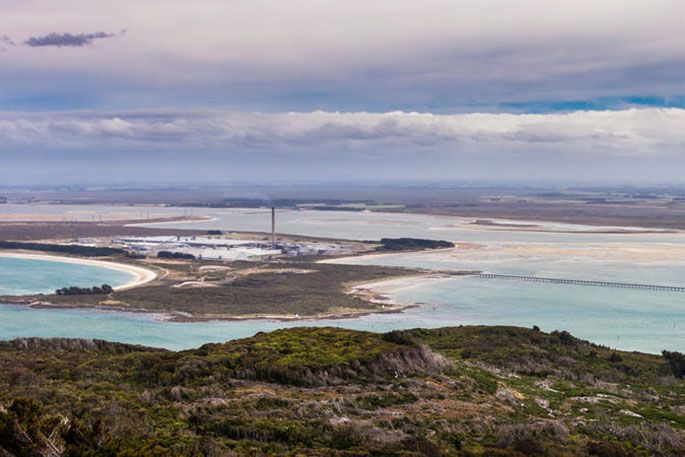Rio Tinto has just announced that it will wind down New Zealand Aluminium Smelters, best known as Tiwai Point smelter.
In a statement to the Australian Stock Exchange, the company says its strategic review has "shown the business is no longer viable given high energy costs and a challenging outlook for the aluminium industry".
The company has given Meridian Energy notice to terminate its power contract, which ends in August next year. It expects the wind-down of operations will be done by then.
It says it has had discussions with interested parties, but could not secure a power contract that would have kept the smelter competitive and profitable.
The smelter's viability has been questioned for much of the past decade as it grappled with weak metal prices, power costs, and over capacity which has seen smelters closed around the world.
NZ Aluminium Smelters chief executive Stu Hamilton told Morning Report they were on a path to winding down operations.
"This is a very serious situation."
He says it's very disappointing they could not get an outcome to keep the smelter running.
Last year it announced a $46m loss, with Hamilton saying at the time it had been hit by a 15 per cent fall in global prices, but most notably from high power and transmission costs.
"No matter how hard or efficiently the team here works, we can't consistently offset the high price of power and transmission charges we face."
Recently, there has been even more pressure on aluminium supplies globally with the slow down or collapse of aluminium-intensive industries like car manufacturing, aeroplane and aerospace production, due to the COVID-19 pandemic.
Rio Tinto Aluminium chief executive Alf Barrios says the wind-down "will have a significant impact" on workers and the community.
"It is not a decision we have made lightly and without significant careful consideration."
The smelter is New Zealand's largest power consumer, using around 12 per cent of the country's electricity
It employs about 1000 people directly and creates a further 1600 indirect jobs in Southland.
When the smelter was placed under review last October, Meridian dubbed the possibility of closure "Smexit", a conflation of smelter and Brexit.
The smelter is owned by Rio Tinto and Japan's Sumitomo Chemical Co. It reported an underlying net loss of NZ$46 million ($29 million) for 2019, down from a net profit of NZ$22 million the previous year.
Dispute over hazardous waste
The smelter company is also embroiled in a dispute over some 10,000 tonnes potentially toxic ouvea premix wasted stored a disused paper mill in Mataura.
The Environmental Defence Society has filed court proceedings against New Zealand Aluminium Smelters, asking the court to decide who had responsibility under the Resource Management Act.
While New Zealand Aluminium Smelters contracted Taha Asia Pacific to take care of the waste product in 2011, the Environmental Defence Society was arguing that contract - and Taha's subsequent liquidation - should not absolve the smelter of responsibility.
The ouvea premix - a by-product of production at Tiwai Point facility - was dumped at the mill without resource consent in 2015 by Taha Asia Pacific.
Taha went into liquidation the following year and the waste sat there until March 2018, when government and local councils agreed to a $4 million deal with New Zealand Aluminium Smelters to remove and dispose of the waste over six years.



1 comment
Great news.
Posted on 09-07-2020 11:04 | By peecee09
Rio Tinto has been ripping NZ off for years by demanding cheap electricity and threatening to close if they didn’t get their way. Now Nz has a great opportunity to use that vast generation capacity of Manapouri ( 800 MW ) I see 2 viable options that could be considered. 1. Add the 800 MW to the national grid and legislate for cheaper power for consumers. Or 2. Use the existing factory and work force to use the electricity to manufacture Hydrogen. Hydrogen is significantly cheaper than petroleum and burns with NIL pollution. The only byproduct is water. The cost of converting a car to run on hydrogen is less than $1000. Let’s be bold and do it. We have the energy, the workforce, and the plant.
Leave a Comment
You must be logged in to make a comment.